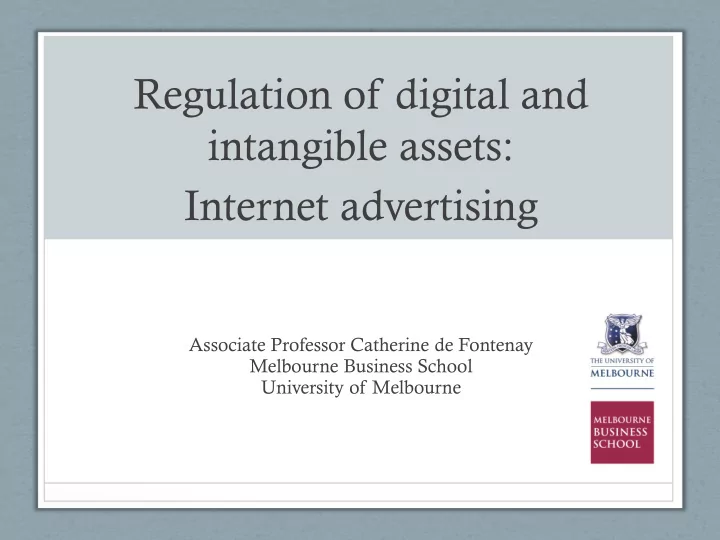

Regulation of digital and intangible assets: Internet advertising Associate Professor Catherine de Fontenay Melbourne Business School University of Melbourne
1. Market definition • There is no “market for online advertising” , just a national market for advertising. Competition between online channels and newspapers, magazines, TV , radio, …
Australia’s changing advertising spend http://www.abc.net.au/news/2016-01-29/global-internet-giants-crushing- australian-media/7125458
Advertising revenues for traditional media are falling much faster than their market share Newspapers https://print21.com.au/rough-times- ahead-for-print-ads-says-pwc/142203
Healthy competition • Evidence suggests that firms find online advertising to be more cost-effective Like a better quality product on the market: gaining market share, but for the right reasons! Firms who advertise are better off, for now; may not be better off as other advertising outlets disappear. No regulatory intervention required (other than perhaps subsidies to quality journalism).
2. How much market power among the new advertisers? • Initial glance suggests there is strong market power in advertising: • Google and Facebook have around 40% share of total advertising revenue in Australia in 2018 (and 67% of online)
Market for Bundles • Online advertising is described as “targeted” • But there is no market for an individual: • Rather, standardised bundles of consumers are sold: 100,000 impressions by “ female fashionistas aged 18- 24” • Standardisation creates thick markets: many buyers and many sellers offering their pages for ads
Quality problems in the market for bundles • Facebook sells ad space on Facebook; space on other web pages is sold directly, or through “data brokers” • Evidence that the bundles constructed by data brokers are unreliable (Neumann, Tucker, Whitfield 2018) • In their field experiment, gender was accurately identified 55% to 81% of the time, depending on the data broker • Big variation in brand safety, viewings by “bots”, non - unique viewings
Is the Market for Bundles a “Market for Lemons ”? (Neumann, 2018) When quality is unknown by buyers, bad quality (lemons) proliferates and drives good quality out of the market. • Low price and low quality characterises the ad exchanges High-quality publishers don ’ t use ad exchanges • Creates a substantial premium for ad sellers with a reputation for better data = Google, Facebook • Creates incentive to merge with those firms
What regulation? • Will the love affair with “targeted” advertising be short-lived? • Quality verification would reduce the price premium for Google and Facebook • Would aggravate the decline of newspaper/TV advertising, however.
3. Price discrimination • Amazon is both selling products and advertising those products on its site Can use richer information in targeting customers Can (and does) price discriminate (Mikians et al. 2012) • Not problematic if high-income customers pay more • Very problematic if less internet-savvy customers pay more (what we see in electricity pricing) May consider regulating.
Search discrimination • Evidence that high-income people are shown more expensive choices on comparison shopping sites (Mikians et al. 2012) = means higher margin for the site = implicit price discrimination
Search discrimination • Evidence that high-income people are shown more expensive choices on Google (Mikians et al. 2012) • Google sells “high - income” customers in bundles to advertisers the bidding process means more expensive choices appear = advertisers could also use this information to price discriminate (no evidence yet that they do so).
Mikians et al. (2012) • Evidence that high-income people are shown more expensive choices on Google (Mikians et al.)
Recommend
More recommend